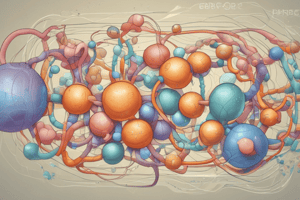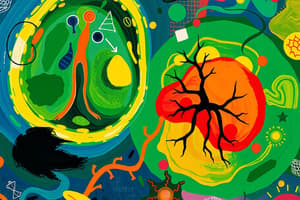Podcast
Questions and Answers
What is the primary function of triglycerides in the body?
What is the primary function of triglycerides in the body?
- Hormone regulation
- Energy production
- Protein synthesis
- Energy storage (correct)
What is the first stage of cellular respiration?
What is the first stage of cellular respiration?
- Oxidative phosphorylation
- Glycolysis (correct)
- Glycogen synthesis
- Citric acid cycle
What is the byproduct of glycolysis that is used to generate energy?
What is the byproduct of glycolysis that is used to generate energy?
- Pyruvate and lactate
- Glycogen and glucose
- FADH2 and ATP
- ATP and NADH (correct)
What hormone stimulates glycogen synthesis?
What hormone stimulates glycogen synthesis?
What is the process by which lipids are broken down into fatty acids and glycerol?
What is the process by which lipids are broken down into fatty acids and glycerol?
What is the importance of cellular respiration?
What is the importance of cellular respiration?
What is the function of glycogen in the body?
What is the function of glycogen in the body?
What regulates glycolysis?
What regulates glycolysis?
What is the role of glucagon in glycogen synthesis?
What is the role of glucagon in glycogen synthesis?
What are the three stages of cellular respiration?
What are the three stages of cellular respiration?
Flashcards are hidden until you start studying
Study Notes
Lipid Metabolism
- Lipid metabolism involves the breakdown and synthesis of lipids (fats) in the body
- Lipids are broken down into fatty acids and glycerol, which are then used for energy production or stored for later use
- Lipid metabolism is regulated by hormones such as insulin and glucagon
Triglycerides
- Triglycerides are the main component of fats and oils in the diet
- Composed of three fatty acid chains attached to a glycerol molecule
- Function:
- Energy storage: Triglycerides are stored in adipose tissue and released as needed for energy production
- Hormone regulation: Triglycerides can influence hormone production and regulation
Glycolysis
- Glycolysis is the first stage of cellular respiration
- Breakdown of glucose (a simple sugar) into pyruvate, producing ATP and NADH
- Takes place in the cytosol of cells
- Regulation:
- Allosteric control: Enzymes involved in glycolysis are regulated by allosteric effectors
- Feed-back inhibition: ATP and NADH can inhibit glycolysis when energy levels are high
Cellular Respiration
- Cellular respiration is the process by which cells generate energy from glucose
- Involves three stages: glycolysis, citric acid cycle, and oxidative phosphorylation
- Produces ATP, NADH, and FADH2 as byproducts
- Importance:
- Energy production: Cellular respiration generates energy for the cell
- ATP synthesis: ATP is produced during cellular respiration and is used to power cell functions
Glycogen Synthesis
- Glycogen synthesis is the process by which glucose is converted into glycogen
- Glycogen is a complex carbohydrate stored in the liver and muscles
- Regulation:
- Insulin: Stimulates glycogen synthesis by activating glycogen synthase
- Glucagon: Inhibits glycogen synthesis by inhibiting glycogen synthase
- Function:
- Energy storage: Glycogen is a readily available source of energy for the body
- Blood glucose regulation: Glycogen helps to regulate blood glucose levels by storing excess glucose
Studying That Suits You
Use AI to generate personalized quizzes and flashcards to suit your learning preferences.





